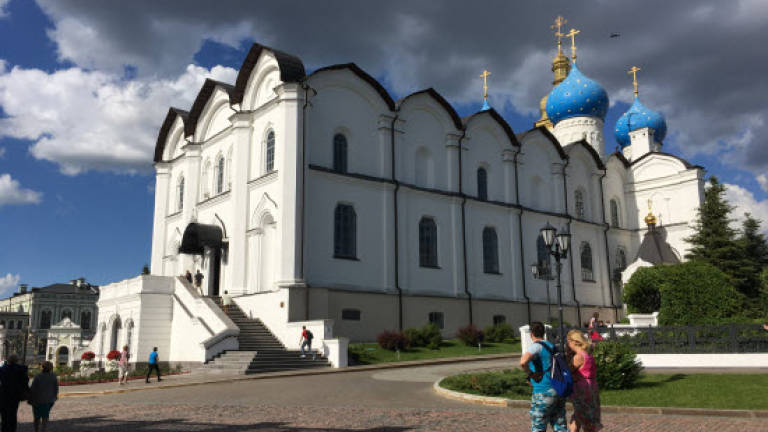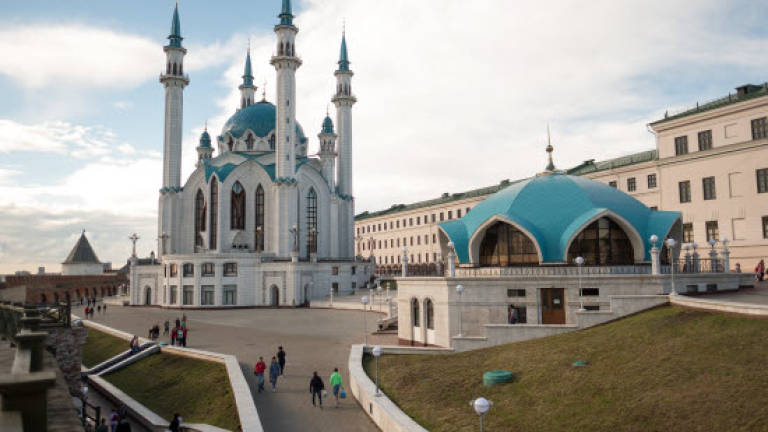KAZAN, THE CROSSROADS WHERE ISLAM AND CHRISTIANITY GO HAND IN HAND


KAZAN (dpa) – Barely 100 metres separate Kazan’s mosque, one of the largest in Europe, from Annunciation Cathedral, the great Orthodox temple in the Russian city. That is not an accident, but rather a symbol of the closeness between Muslims and Christians that is ingrained in Kazan’s identity.
An ancient city and a young city all at once, a crossroads and a place where many stories come together, this city with 1.2 million residents is home to people with more than 100 nationalities and to approximately 180,000 students. It features a diverse and open atmosphere, along with a solid sports tradition that is set to reach its climax when Kazan hosts games at the Russia 2018 football World Cup.
"I think our peaceful coexistence is based on history. Russians and Tatars have been here for centuries, and governments have worked hard for them to get along," Razida, a tourist guide, tells dpa before the mosque in Kazan’s Kremlin, a set of buildings that is a Unesco World Heritage Site.
Kazan, the capital of the autonomous republic of Tatarstan, developed between the East and the West. Founded in 1005 on the banks of the Volga River, about 800 kilometres east of Moscow, it was a stop on the Silk Road, an ancient route for the exchange not only of goods but also of habits and cultures.
Close to 51 per cent of Tatarstan’s population are Muslims, while the rest are mostly Russian Orthodox Christians. With such a balance, it is not hard to find groups of friends or even couples in Kazan with a mix of those two religions and others.
Regina, the daughter of a Jewish man and a Muslim woman, is a case in point.
"In my opinion, the Islam of Tatarstan’s Tatars is very different from what you see elsewhere in the world. People here are more tolerant. Perhaps history made that possible, but I think it comes down to people," she says.
The 26-year-old notes that her father’s whole family is Jewish and her mother’s whole family is Muslim. Both sides would have expected to stick to their faith, she notes.
"But things turned out differently. And I don’t remember anyone rejecting anyone else for religious reasons. They were all fine with it," Regina says.
As is the case for many Kazan residents, Regina’s memories show a mix of experiences.
"When I was a child, I went to a Jewish school, but my mum would take me to Tatar festivals. During the day, I would sing Jewish songs. In the evening, I would eat typical Tatar pies. I think there are many families like mine in Tatarstan," she says.
That mixed society is apparent on every corner of what is regarded as Russia’s "third capital," after Moscow and Saint Petersburg. There are signs in several languages, restaurants that offer food from diverse cultures and the city’s well-known clock, decorated with Arabic script, at the end of Bauman street, Kazan’s main pedestrian zone.
Qol Sarif mosque, opened in 2005 with a capacity for 6,000 faithful on a site that once held the original mosque destroyed by Ivan the Terrible in the sixteenth century, competes for significance with others, including Mardzhani mosque, the oldest in the city (1767) and the only one that remained open in the Soviet era.
For Orthodox Christians, however, the city’s main symbol is Our Lady of Kazan, an icon of the Virgin Mary that attracts visitors from around the world. They flock to see a seventeenth-century copy held at Holy Cross Cathedral, where the now-lost original was once found.
A third major building highlights Kazan’s identity: its powerful university. Founded in 1804, it welcomed the likes of Leo Tolstoy and Vladimir Lenin, and it turned the city into its current vibrant, unprejudiced self. There are students everywhere, whether sitting by the river or strolling along commercial streets.
The new Kazan Arena, the state-of-the-art Rubin Kazan stadium opened in 2013, is not far out. It is set to host six World Cup games, where it should surprise no one to see the local Muslim leader sitting next to the city’s Russian Orthodox leader.
"They both love football," says tourist guide Razida.